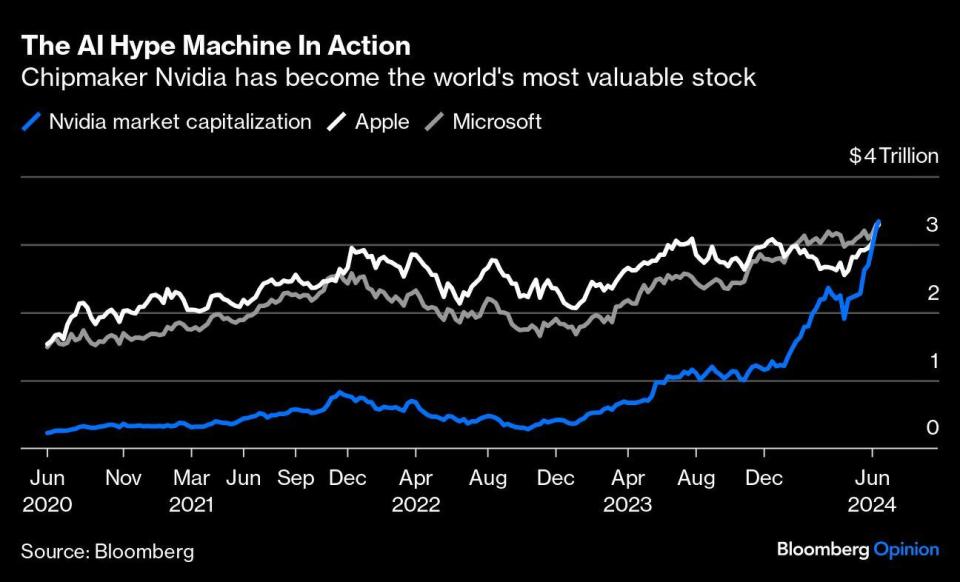Google says AI is magic. Businesses are finding out it isn't

AI isn’t yet a jack-of-all-trades but a master of a few.
Does anyone in Silicon Valley know the saying, “The bigger they are, the harder they fall?” Perhaps it’s just a matter of time before they will.
Tech company leaders should be wincing at the rapid ascension of Nvidia Corp now that the artificial intelligence rally has propelled the chipmaker to become the world’s most valuable company. This is a firm that sells coveted AI chips to a handful of cloud giants who are reaping the short-term benefits of AI hype, even as things are looking murkier downstream. It’s hard to see how Nvidia CEO Officer Jensen Huang will sustain such growth (even as he steers his company into selling software), and he can thank himself and his peers. Tech giants like Alphabet Inc, Amazon.com Inc and Microsoft have warped expectations for generative AI’s contribution to profits. They will pay for that if they don’t temper expectations.
This recent tweet from Google sums up where they’ve gone wrong: The Gemini era is here — helping you do more with the magic of Google AI.
No, Google. AI isn’t “magic.” And to frame it as such — even in a tweet — is already leading to disappointment. Further down the value chain, away from the glow of Nvidia, lurk signs of discontent. Businesses have cut back on whizzy new AI tools out of concern for hallucinations, cost and data security. The proportion of global companies planning to increase spending on AI over the next 12 months has slipped to 63% from 93% a year earlier, according to a recent survey of 2,500 business leaders by software company Lucidworks Inc. Meanwhile, just 5% of companies in the US are using AI, according to the Census Bureau.
If you were to measure the malaise with the Gartner Hype Cycle, AI would be deep in the “trough of disillusionment."
Gartner’s chart illustrates a common path for new technology and suggests a “plateau” can be reached once its true usefulness registers in the market’s consciousness. How to get there? First, tech companies need to identify where their hype machine has gone wrong. They didn’t set expectations for AI’s capabilities too high; they framed its use as being too general purpose.
You can partially blame that on Sam Altman, who leads OpenAI, and Demis Hassabis, who leads Google’s AI efforts, who both chased lofty goals of building computers with “general” intelligence before they sparked the recent AI arms race. Artificial general intelligence (AGI) is a vague term referring to computers that can surpass the multifaceted abilities of humans and thus fix myriad problems. There lies the issue.
Sometimes, tech companies have a clear North Star to aim for. Think of Salesforce Inc’s vision to help companies better connect with their customers with its software tools, or Netflix Inc trying to become the world’s leading entertainment service with streamed content. OpenAI’s and Google’s AGI goals are even grander, so much so that they’ve lost all meaning, from creating abundant wealth for humanity, according to Sam Altman, to solving climate change and curing cancer, according to Hassabis.

The AI Hype Machine In Action | Chipmaker Nvidia has become the world's most valuable stock
When sweeping, idealistic dreams trickle down into sales and marketing channels, AI’s potential uses become unclear. Framing AI as a general-purpose Swiss Army knife for productivity inevitably leads to paralysis for its end users: Where do you even start with a technology that can do everything?
The truth about AI is that it can be useful and even financially beneficial when people are given time to experiment with it. The technology’s biggest proponents should remember how the advent of mobile first took off, with office workers bringing their early iPhones and other personal devices into work and demanding that IT plug them into the corporate email system. Much the same phenomenon could happen with generative AI, as some of the most successful case studies come from individuals who use it for personal productivity.
An anecdote from a recent New York Times story illustrates this phenomenon well: “Allison Giddens, a co-president at Win-Tech, an aerospace manufacturing company with 41 employees in Kennesaw, Ga., said she started using ChatGPT about six months ago for some operational tasks, like writing emails to employees, analyzing data and drafting basic procedures for the company’s front office. A note taped to her computer monitor says simply “ChatGPT” to remind her to use the technology… But she faces hurdles in implementing it more broadly and using it to make her company more efficient.”
Forcing large numbers of people in a workforce to deal with “general purpose” technology is a recipe for failure. As Microsoft, Google and Amazon pitch their AI tools, they should warn their customers that the tech can take years to get used to, and also narrow down the potential use cases more explicitly. For instance, using it to provide text-based responses to customers can be far more successful than tailoring AI to make predictions, according to the Lucidworks survey.
McDonald’s Corp’s failed AI drive thru is a case in point. It relied on picking up people's orders on a mic and got confused by background noise. But a different approach by payments company Klarna Bank, to use ChatGPT’s technology for text-based customer service, has been far more successful. It cut its sales and marketing spending by 11% in the first quarter of 2024 as a result.
AI isn’t yet a jack-of-all-trades but a master of a few. The sooner business leaders realize they can apply it to an array of niches and not for everything, everywhere, all at once, the sooner they can make the technology useful for them. But they’ll need more level-headed guidance from tech firms, which must resist pitching AI as a general-purpose quick fix and “magic.” Such rhetoric is fuel for a bubble if they don’t.
See Also:
Click here to stay updated with the Latest Business & Investment News in Singapore
Nvidia becomes world's most valuable company as AI rally steams ahead
Get in-depth insights from our expert contributors, and dive into financial and economic trends

 Yahoo Finance
Yahoo Finance 